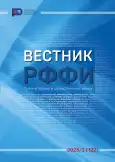Russian Old-Timers in Mongolia: Identity, Language, Culture
- Authors: Bitkeeva A.N.1
-
Affiliations:
- Research Center for National and Linguistic Relations at the Institute of Linguistics of the Russian Academy of Sciences, and the Gorky Institute of World Literature of the Russian Academy of Sciences.
- Issue: No 3(122) (2025)
- Pages: 148-159
- Section: FUNCTIONING OF LANGUAGES IN MULTILINGUAL ENVIRONMENT
- URL: https://journal-vniispk.ru/2587-6090/article/view/314922
- DOI: https://doi.org/10.22204/2587-8956-2025-122-03-148-159
- ID: 314922
Cite item
Full Text
Abstract
Russian old-timers in Mongolia are a diasporic group of Russians that resulted from three waves of migration to Mongolia in the mid-19th and early 20th centuries. This determined the heterogeneous social and ethnic structure of the diaspora. Considering that Mongolia was included in the Chinese civilization space for more than two centuries (until 1911), the Russians who moved there in mid-19th and early 20th centuries communicated with Mongols, as well as Chinese, engaging in trade, agriculture and handicrafts. The ethnogenesis and linguistic image of the Russian old-timers in Mongolia includes the Chinese aspect in addition to the Mongolian, which is reflected in their linguistic and ethnic and cultural characteristics. A comprehensive study of these aspects reveals the diasporic adaptation strategies in a non-ethnic environment; hence, the author is able to present a new theoretical approach to the study of diasporas, changes in their ethnic and cultural and ethnic and linguistic attitudes. The relevance of the research is determined primarily by the low availability of materials on the culture and language of the Russian old-timers in Mongolia. The article examines the linguistic image of the Russian old-timers in Mongolia in close connection with the subjects of their historical memory, analyzes the factors of vitality of the Russian diaspora in Mongolia, and focuses on specific features of the ethnic group's memory policy. Russian old-timers in Mongolia have a peculiar historical memory which reflects the stages of development of the diaspora, its ethnic and cultural context and self-identification. This is especially visible in the narratives of modern Russian old-timers in Mongolia. The article presents the material of a field study of the Russian old-timers in Mongolia conducted in 2023 and 2024 in Ulaanbaatar, Darkhan and Dzun-Khar in Mongolia. Russian old-timers in Mongolia construct the image of the diaspora as a community that by force insurmountable circumstances was torn away from its homeland, Russia, but remained faithful to it at all times, despite rejection and discrimination. The pronounced "Russianness"in the identity of the Russian old-timers in Mongolia determines their vitality, homogeneity and internal connections within the ethnic group, which allows to preserve and pass family and community traditions.
Keywords
About the authors
A. N. Bitkeeva
Research Center for National and Linguistic Relations at the Institute of Linguistics of the Russian Academy of Sciences, and the Gorky Institute of World Literature of the Russian Academy of Sciences.
Author for correspondence.
Email: an.bitkeeva@iling-ran.ru
Doctor of Philology, Head, Leading Researcher
Russian Federation, MoscowReferences
- Timkovskij E.F. Puteshestvie v Kitaj chrez Mongoliyu, v 1820 i 1821 godah: S kartoyu, chertezhami i risunkami. Pechatano po vysochajshemu poveleniyu, izhdiveniem kazny. Pereezd do Pekina. Sankt-Peterburg: v Tipografii Medicinskogo departamenta Ministerstva vnutrennih del, 1824, 1824. XVIII, 388 p.
- Svechnikov A. P. Russkie v Mongolii: Nabljudenija i vyvody. Sankt-Peterburg: tipo-lit. "Jenergija", 1912. 150 p.
- Majskij I.M. Sovremennaja Mongolija. Irkutsk : Gos. izd-vo. Irkutsk. otd., 1921. 472 p.
- Darevskaja E.M. Sibir' i Mongolija: Ocherki rus.-mong. svjazej v konce XIX-nach. XX v. Irkutsk: Izd-vo Irkut. un-ta, 1994. 396 p.
- Edinarhova N. E. Russkoe konsul'stvo v Urge i Ja. P. Shishmarev. Irkutsk: Reprocentr A1, 2008. 136 p.
- Edinarhova N. E. Kjahta i kjahtinskaja torgovlja (40-60-e gg. XIX v.). Irkutsk: Ottisk, 2015. 163 p.
- Starcev A.V. Russkaja torgovlja v Mongolii (vtoraja polovina HIH - nach. HH v.). Barnaul: Izd-vo Alt. gos. un-ta, 2003. 305 p.
- Mikhalev A.V. Sozdavaja vraga: «mestnorusskie» v Mongolii // Obozrevatel' — Ob-server. 2015. № 9 (308). Pp. 105–119.
- Mikhalev A.V. Politicheskij status mestnorusskogo naselenija Mongolii (1966–2000 gg.) // Vestnik Burjatskogo gosuniversiteta. № 8, 2011. Pp. 180–185.
- Sundueva D. B. Narrativnaja istorija i «zhiznennyj mir» russkoj obshhiny Mongolii // Diskussija. 2014. № 10 (51). Pp. 101–112.
- V chest' 65-letnego jubileja pobedy v Velikoj Otechestvennoj vojne. Ulan-Bator, 2010. 76 p.
- Maslov A.I. Russkie v Mongolii. Ulan-Bator: Мөнхийн Үсэг групп XXК, 2009. 208 p.
- Bruner J. Life as Narrative // Social Research 71. No. 3. 2004. Pp. 691‒710.
- Matveev L. M. Russkaya koloniya v Mongolii // Urginskie vedomosti. 2007. № 10–11. Pp. 5–10.
Supplementary files









